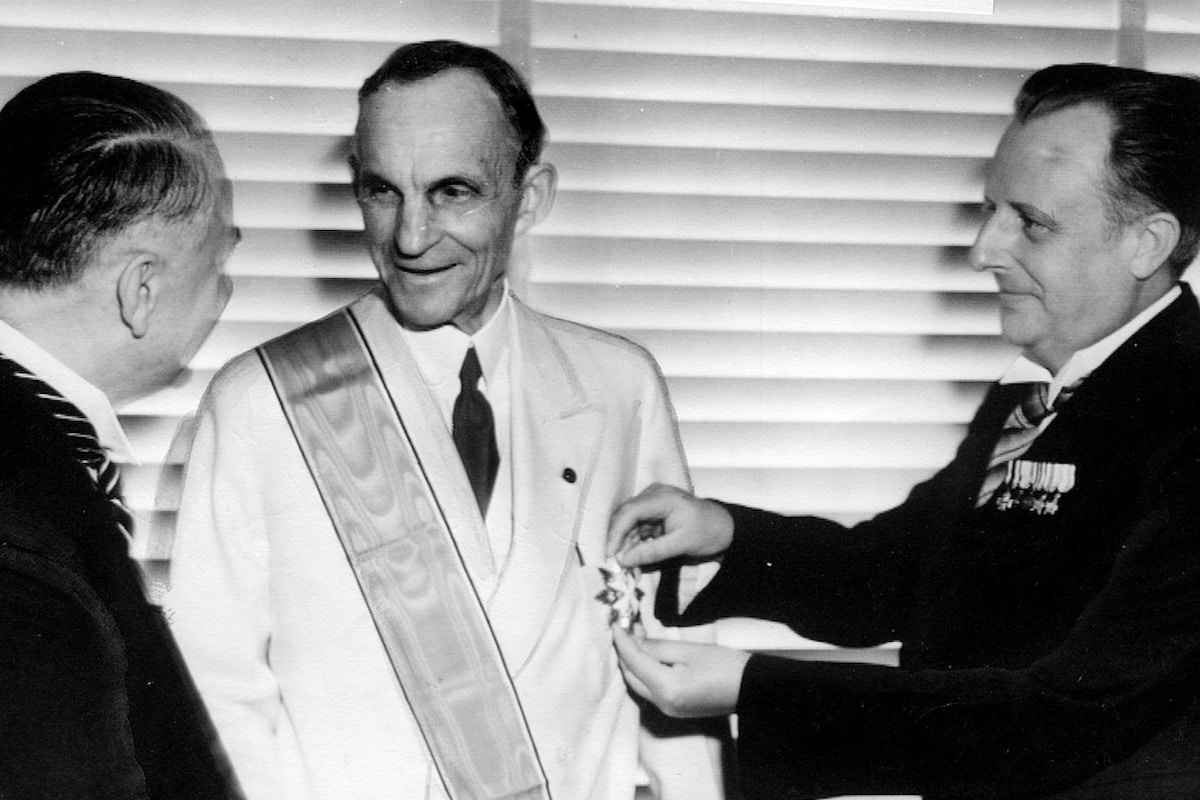
In 1938, Henry Ford accepted Nazi Germany's highest honor for foreigners, The Grand Cross of the German Eagle, for his service to the Third Reich. The award was presented by two Nazi diplomats in Detroit, along with a personal message from Adolf Hitler. Photo: Associated Press File
"Italian fascism and German Nazism had their admirers within the
U.S. business community and the corporate-owned press. Bankers,
publishers, and industrialists, including the likes of Henry Ford,
traveled to Rome and Berlin to pay homage, receive medals, and
strike profitable deals. Many did their utmost to advance the Nazi
war effort, sharing military-industrial secrets and engaging in secret
transactions with the Nazi government, even after the United States
entered the war.
During the 1920s and early 1930s, major publications like Fortune, the Wallstreet Journal Saturday Evening Post, New
York Times, Chicago Tribune, and Christian Science Monitor hailed
Mussolini as the man who rescued Italy from anarchy and radicalism. They spun rhapsodic fantasies of a resurrected Italy where
poverty and exploitation had suddenly disappeared, where Reds had
been vanquished, harmony reigned, and Blackshirts protected a
"new democracy."
The Italian-language press in the United States eagerly joined the
chorus. The two most influential newspapers, Vltalia of San
Francisco, financed largely by A.R Giannini s Bank of America, and
Il Progresso of New York, owned by multimillionaire Generoso Pope,
looked favorably on the fascist regime and suggested that the United
States could benefit from a similar social order.
Some dissenters refused to join the "We Adore Benito" chorus.
The Nation reminded its readers that Mussolini was not saving
democracy but destroying it. Progressives of all stripes and various
labor leaders denounced fascism. But their critical sentiments
received little exposure in the U.S. corporate media.
As with Mussolini, so with Hitler. The press did not look too
unkindly upon der Fuehrers Nazi dictatorship. There was a strong
"Give Adolph A Chance" contingent, some of it greased by Nazi
money. In exchange for more positive coverage in the Hearst newspapers, for instance, the Nazis paid almost ten times the standard
subscription rate for Hearsts INS wire service. In return, William
Randolph Hearst instructed his correspondents in Germany to file
friendly reports about Hitlers regime. Those who refused were
transferred or fired. Hearst newspapers even opened their pages to
occasional guest columns by prominent Nazi leaders like Alfred
Rosenberg and Hermann Goring.
By the mid to late 1930s, Italy and Germany, allied with Japan,
another industrial latecomer, were aggressively seeking a share of the
world s markets and colonial booty, an expansionism that brought
them increasingly into conflict with more established Western capitalist nations like Great Britain, France, and the United States. As the
clouds of war gathered, U.S. press opinion about the Axis powers
took on a decisively critical tone."
"After World War II, the Western capitalist allies did little to eradicate fascism from Italy or Germany, except for putting some of the top
leaders on trial at Nuremberg. By 1947, German conservatives began
to depict the Nuremberg prosecutors as dupes of the Jews and communists. In Italy, the strong partisan movement that had waged armed
struggle against fascism was soon treated as suspect and unpatriotic.
Within a year after the war, almost all Italian fascists were released
from prison while hundreds of communists and other leftist partisans
who had been fighting the Nazi occupation were jailed. History was
turned on its head, transforming the Blackshirts into victims and the
Reds into criminals. Allied authorities assisted in these measures.
Under the protection of U.S. occupation authorities, the police,
courts, military, security agencies, and bureaucracy remained largely
staffed by those who had served the former fascist regimes or by their
ideological recruits—as is true to this day. The perpetrators of the
Holocaust murdered six million Jews, half a million Gypsies, thousands of homosexuals, several million Ukranians, Russians, Poles,
and others, and got away with it—in good part because the very
people who were supposed to investigate these crimes were themselves complicit."
- Michael Parenti
Information sourced from Blackshirts and Reds by Michael Parenti.
